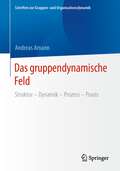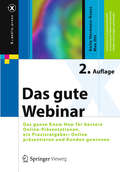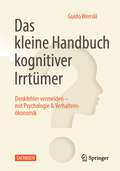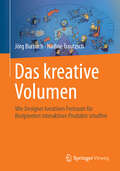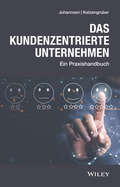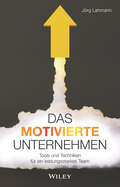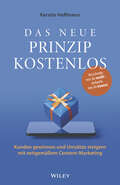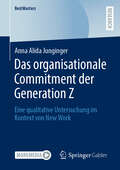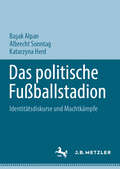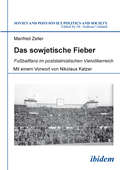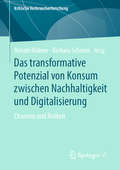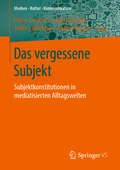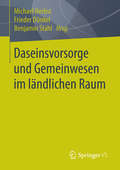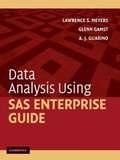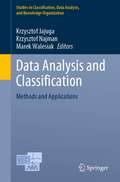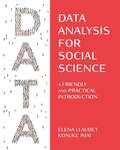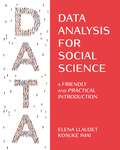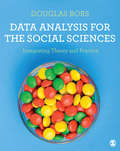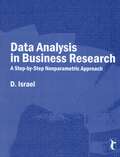- Table View
- List View
Das gesellschaftliche Unbehagen in der EU: Ursachen, Dimensionen, Folgen
by Wolfgang AschauerDas Buch hat das Ziel, die aktuellen gesellschaftlichen Entwicklungsdynamiken in der Europäischen Union umfassend zu beleuchten und Ursachen, Charakteristika und potentielle Folgen des weitreichenden gesellschaftlichen Unbehagens in der EU auf Basis theoretischer Ansätze und empirischer Befunde aufzuzeigen. Im Zentrum der Analyse stehen gegenwärtige Herausforderungen der Sozialintegration der EU-BürgerInnen und damit verbundene Beeinträchtigungen des gesellschaftlichen Wohlbefindens. Derartige Dynamiken erschweren den weiteren europäischen Einigungsprozess, weil aufgrund der fehlenden Sozialintegration von EU-BürgerInnen eine Kraft ausgehen könnte, die in der gegenwärtigen Europaforschung häufig unterschätzt und zu wenig thematisiert wird. Diese Forschungslücke soll in der Monographie sowohl durch ein umfassendes, theoriegeleitetes Erklärungsmodell als auch durch eine methodisch elaborierte ländervergleichende Studie geschlossen werden.
Das gruppendynamische Feld: Struktur – Dynamik – Prozess – Praxis (Schriften zur Gruppen- und Organisationsdynamik #14)
by Andreas AmannDieses Buch geht von einigen wenigen Zentralkonzepten aus, die bis heute zum normativen Kernbestand der angewandten Gruppendynamik gehören und legt mit deren Hilfe die Besonderheit des gruppendynamischen Feldes frei. Laboratorium, Trainingsgruppe, Hier und Jetzt-Prinzip sowie Minimalstrukturierung bilden zusammen den strukturellen Rahmen gruppendynamischer Praxis: den gruppendynamischen Raum. Aufbauend auf dieser Strukturrekonstruktion werden Dynamik, Prozess und Praxis der Gruppendynamik – das gruppendynamische Feld - dargestellt.
Das gute Webinar: Das ganze Know How für bessere Online-Präsentationen, ein Praxisratgeber: Online präsentieren und Kunden gewinnen (X.media.press)
by Anita Hermann-Ruess Max OttIn diesem Buch lernen Sie anschaulich und praxisnah, wie Sie ein gutes Webinar organisieren, produzieren und live durchführen.Sie erhalten Antworten auf die Fragen: Was sind Webinare überhaupt? Wie können Sie das Format „Webinar“ in Ihrem Unternehmen sinnvoll einsetzen? Welche Technik benötigen Sie für gute Webinare? Wie produzieren Sie Präsentationen onlinegerecht? Wie halten Sie ein Webinar überzeugend und fesselnd live? Wie nutzen andere Unternehmen und Organisationen dieses Format heute schon erfolgreich?Sechs Kapitel führen Sie in die Welt der Webinare ein mit vielen Materialien, Checklisten, Plänen und Inspirationshilfen. Auf einer extra Website zum Buch erhalten Sie die wichtigsten Vorlagen zum Herunterladen, ein Bonuskapitel zum Thema Onlinemarketing, Beispiel-Webinare zum Anschauen und viele weitere Informationen.
Das kleine Handbuch kognitiver Irrtümer: Denkfehler vermeiden – mit Psychologie & Verhaltensökonomik
by Guido Wenski„Irren ist menschlich" – das alte Sprichwort wird auch durch die Wissenschaft bestätigt: Uns Menschen unterlaufen ständig Denkfehler. Dieses Buch stellt über 300 solcher kognitiver Irrtümer und Verzerrungen, die im Alltag auf uns lauern, auf unterhaltsame Art vor: Ob trügerische Erinnerungen, Beeinflussung unserer Entscheidungen durch Gefühle, Phänomene der Selbstüberschätzung, falscher Umgang mit Geld oder Wahrscheinlichkeiten oder sogar Sichtweisen, die zu Diskriminierung führen – unser komplexes Gehirn neigt zu vorhersagbaren Schnellschüssen, die in der Vorzeit eine Grundvoraussetzung zur Erhaltung unserer Art waren, in heutiger Zeit aber fatale Folgen haben können. Doch es gibt Hoffnung, denn Psychologie und Verhaltensökonomik bieten neben Erklärungsansätzen auch Hinweise zum Umgang mit kognitiven Irrtümern aller Art. Mit diesem Baukasten und zahlreichen Tipps lassen sich falsche Entscheidungen vermeiden. Und so ist dieses kleine Handbuch menschlicher Denkfehler gleichzeitig ein Ratgeber für den täglichen „Hürdenlauf" durch unseren komplizierten Alltag.
Das kreative Volumen: Wie Designer kreativen Freiraum für Rezipienten interaktiver Produkte schaffen
by Jörg Burbach Nadine TrautzschWie weit kann ein Spiel gehen, um uns in seine Welt eintauchen zu lassen? Das theoretische Modell des Kreativen Volumens betrachtet dazu alle narrativen und ludischen Elemente in ihrer Gesamtheit. Dieses Konzept lässt sich auf das Entwickeln und Erleben von Videospielen anwenden, indem es nicht nur Immersion und Einfühlung, sondern auch die subtile Kunst des Weglassens betont. Das Buch vereint disziplinübergreifende Ansätze, um kreative Prozesse sowohl auf Seiten der Entwickler:innen als auch der Spieler:innen zu fördern. Kern des Modells sind die drei Dimensionen: Kreatives Fundament (durch die Entwickler:innen gestaltete Elemente), Kreatives Potenzial (die schöpferische Interaktion der Spieler:innen) und Kreative Resonanz (Auswirkungen des Spiels über dessen Grenzen hinaus).Es bietet praxisorientierte Leitlinien, wie gestalterische Entscheidungen die emotionale, narrative und soziale Interaktion im Spiel formen können. Es zeigt auf, wie durch bewusste Gestaltung Freiräume für kreative Entfaltung geschaffen und reflektiert werden können und wir somit Spiele zu kulturellen Artefakten und Resonanzräumen entwickeln können. Mit Blick auf die zunehmende Komplexität interaktiver Produkte schafft das kreative Volumen ein Vokabular und einen Rahmen, um Spielentwicklung strategischer, wirkungsvoller und inspirierender zu gestalten. Die Zielgruppe umfasst Game Designer:innen, Entwickler:innen, Künstler:innen und Forscher:innen, die ihr Verständnis von kreativer Interaktivität vertiefen und die gestalterische Praxis auf ein neues Level heben möchten. Begleitmaterial unter https://www.kreatives-volumen.de
Das kundenzentrierte Unternehmen: Ein Praxishandbuch
by Werner Katzengruber Dirk JohannsenDie Zukunftsfähigkeit von Unternehmen hängt vor allem davon ab, Kundenloyalität zu fördern und neue Kunden zu gewinnen. Jack Welch propagierte vor mehr als drei Jahrzehnten bereits, dass der Kunde das Gehalt der Mitarbeiter bezahlt und schrieb dies auch auf jeden Gehaltsscheck. Was altmodisch klingt, hat auch heute noch Gültigkeit und wird getrieben durch neue Kundengenerationen und disruptive Technologien, die den althergebrachten Kundenbeziehungen den Garaus machen. Bei einem kundenzentrierten Unternehmen steht der Kunde in allen Belangen im Mittelpunkt und das bedeutet, der Kunde steuert das Unternehmen. Das gilt für den Mittelstand ebenso wie für Konzerne. In einer kundenzentrierten Organisation muss jeder Bereich seinen Beitrag für die Zufriedenheit des Kunden leisten. Somit könnte man das Bild bemühen, dass das gesamte Unternehmen zum Lösungslieferanten wird. Das leitet einen Kulturwandel ein, der die DNA der meisten Unternehmen grundlegend verändert. Nicht nur die Konzerne stehen einer neuen Generation von Kunden gegenüber, deren Loyalität jeden Tag neu verdient werden muss. Kundenzentrierung (Customer Centricitiy) wird auch für den Mittelstand zur Überlebensfrage. Parallel zu den stetig steigenden Anforderungen der Kunden steigen die Bemühungen, diesen gerecht zu werden. Obwohl sich viele Unternehmen der Kundenzentrierung verschrieben haben, spüren die Kunden nur wenig davon. Die Gründe dafür sind vielfältig und werden im Buch von Werner Katzengruber und Dirk Johannsen unter anderem in Experteninterviews klar benannt. Was Kundenzentrierung wirklich bedeutet, und wie Sie Ihr Unternehmen nachhaltig und ganzheitlich auf den Kunden ausrichten, beschreibt dieses Buch. Die beiden Autoren stellen den Lesern in der Praxis bewährtes Wissen zur Verfügung, welches sie in über 20 Jahren gesammelt haben. Fragebögen geben außerdem die Möglichkeit, die für die eigene Organisation relevanten Antworten zu erarbeiten.
Das motivierte Unternehmen: Tools und Techniken für ein leistungsstarkes Team
by Jörg LahmannWas ist eigentlich Motivation? Kann man sie erzeugen, vervielfältigen und weitergeben? Was muss man tun, um sie zu bewahren, wenn man sie einmal errungen hat? Fragen, mit denen sich viele Führungskräfte immer wieder auseinandersetzen müssen. Jörg Lahmann liefert in seinem Buch die Antworten. Seine Überzeugung: Motivation gedeiht dauerhaft nur in einem richtig strukturierten Umfeld. Mit seinen Tools und Techniken im Buch liefert er nun die Bauanleitung. Das Ziel jeder Führungskraft ist, ein motiviertes Team zu haben. Das funktioniert weder mit einfachen Tricks noch mit charmanten Witzen. Damit es gelingt, erklärt das Buch zunächst die Theorie der Motivation und legt dann ein klar aufgebautes Modell vor, ein Rezept sozusagen, Motivation im Unternehmen entstehen zu lassen. Die Grundlage für Jörg Lahmanns Modell des motivierten Unternehmens liefern neueste Erkenntnisse aus den Bereichen Management, Soziologie, Wirtschaft, Psychologie und Neurowissenschaften. Außerdem finden die Leser im Buch zahlreiche Beispiele und Übungen, mit denen sie die einzelnen Bestandteile des Modells sowie die externen und internen Faktoren, die ins Spiel kommen, identifizieren und herausfinden können, wie es in ihrem Unternehmen oder Team um die Motivation bestellt ist und wo Verbesserungsbedarf besteht. Jörg Lahmann liefert die dafür nötigen Strategien und Tools und erklärt anhand von Fallbeispielen, wie man diese richtig einsetzt. Abgerundet wird das Buch dann durch einen Leitfaden oder Aktionsplan, der aufzeigt, wo Führungskräfte loslegen müssen, Methoden zur Selbstevaluation inklusive, mit denen sie die Fortschritte ihres Unternehmens messen können.
Das neue Prinzip kostenlos: Kunden gewinnen und Umsätze steigern mit zeitgemäßem Content-Marketing
by Kerstin Hoffmann"Verschenke, was du weißt - um das zu verkaufen, was du kannst!" - Fachkenntnisse als Basis für ein erfolgreiches Content-Marketing: Die renommierte Kommunikations- und Strategieberaterin Dr. Kerstin Hoffmann zeigt, wie Unternehmen jeder Größe ebenso wie einzelne Freiberufler und Solopreneure zu mehr Sichtbarkeit, einer besseren Marktposition, neuen Kunden und höheren Umsätzen gelangen. "Das neue Prinzip kostenlos" bietet Einsteigern und Fortgeschrittenen das passende Handwerkszeug, um ihre eigene Vorgehensweise zu entwickeln und zu dauerhaftem Erfolg zu führen. Der praxisnahe Ratgeber führt Sie durch die gesamte Content-Marketing-Strategie: Wie lässt sich Wissen attraktiv aufbereiten? Welche sind die richtigen Plattformen und Medien für die Verbreitung? Wie wandeln Sie die Aufmerksamkeit Ihrer Zielgruppen in gut bezahlte Aufträge um? Die neue Fassung dieses Standardwerks ist viel mehr als eine komplett überarbeitete 3. Auflage: Sie spiegelt den aktuellen Stand der digitalen Kommunikation wider, greift aktuelle Trends sowie Praxiserfahrungen auf. Wertvolle Tools und Checklisten sowie ausführliche Anleitungen sind hinzugekommen. Eines der ganz neuen Kapitel befasst sich mit dem Thema Mitarbeiter-Markenbotschafter (Corporate Influencer) mit Fokus auf deren Rolle im Content-Marketing von Unternehmen.
Das organisationale Commitment der Generation Z: Eine qualitative Untersuchung im Kontext von New Work (BestMasters)
by Anna Alida JungingerDer Fachkräftemangel und frühzeitige Fluktuationen fordern Organisationen zu Veränderungen heraus, um Mitarbeitende zu halten. Die Generation Z betritt mit neuen Anforderungen den Arbeitsmarkt, während New Work neue Möglichkeiten für die Arbeitswelt bietet. Unternehmen sollten dahingehend ein Verständnis entwickeln, um das organisationale Commitment von Beschäftigten zu stärken und die Chancen auf den Verbleib beim Arbeitgeber zu steigern. Ziel dieser Ausarbeitung ist die Erarbeitung eines Konzepts mit Handlungsempfehlungen für Unternehmen zur Steigerung des organisationalen Commitments der Generation Z unter Berücksichtigung von Praktiken im Rahmen von New Work. Die Untersuchung stellt die Forschung des organisationalen Commitments, von New Work sowie der Generation Z im Arbeitskontext dar, um den Überschneidungsgrad dieser Bereiche aufzuzeigen. Ergänzend wurden leitfadengestützte problemzentrierte Interviews mit Beschäftigten der Generation Z hinsichtlich ihrer persönlichen Relevanz des organisationalen Commitments sowie möglichen Einflussfaktoren darauf durchgeführt. Nach einer qualitativen Inhaltsanalyse nach Mayring werden für Organisationen Maßnahmen zur Stärkung des organisationalen Commitments der Generation Z im Rahmen eines Konzepts im Kontext von New Work aufgezeigt.
Das politische Fußballstadion: Identitätsdiskurse und Machtkämpfe
by Albrecht Sonntag Başak Alpan Katarzyna HerdDieses Buch konzentriert sich auf das Fußballstadion als politischen Raum und untersucht, wie Stadien als Objekte und Katalysatoren des politischen Wandels betrachtet werden können. Stadien sind nicht nur funktionale Konstruktionen, die für die Austragung von Fußballspielen konzipiert wurden, sondern sie sind auch Wahrzeichen der Stadt, die als Versammlungsorte für große Gemeinschaften dienen.Die Manifestation des Politischen in Fußballstadien zeigt sich in der Unzufriedenheit, die durch Fan-Aktivismus zum Ausdruck kommt, in der Nutzung von Stadien für nationale und lokale Identitätspolitik, in Versuchen der Instrumentalisierung von Emotionen sowohl durch totalitäre als auch durch demokratische Regime, in Fangruppen bei politischen Aufständen und in der Überwachung von Fans durch E-Tickets und Sitzplatzvergabe.Dieser Sammelband vereint eine Vielzahl von Fallstudien aus den unterschiedlichsten Kontexten. Die Beiträge stammen aus den Bereichen Politikwissenschaft, Soziologie, Geschichte, Anthropologie, Humangeographie und Urbanistik. Das Buch definiert und erweitert das Verständnis der politischen Dimension des Fußballstadions neu.
Das politische System der Bundesrepublik Deutschland
by Wolfgang Rudzio Tom MannewitzDas Lehrbuch führt ein in Selbstverständnis, institutionellen Aufbau und Praxis des politischen Systems der Bundesrepublik Deutschland. Das Werk gibt einen problemorientierten Überblick über die verfassungs- und außenpolitischen Grundentscheidungen, die die deutsche Demokratie konstituiert haben; das politische Kräftefeld, das durch Interessengruppen, Bürgerinitiativen, Parteien und Massenmedien gebildet wird; die politischen Institutionen in Bund, Ländern und Kommunen; die gesellschaftliche Reichweite und administrative Durchsetzung politischer Entscheidungen; die politische Kultur einschließlich der Struktur der politischen Führungsschicht. Die Neuauflage thematisiert u.a. auch die Folgen der Corona-Krise für das politische System, das sich wandelnde Parteiensystem und die Krise der EU nach der Bundestagswahl 2021.
Das sowjetische Fieber: Fußballfans im poststalinistischen Vielvölkerreich (Soviet and Post-Soviet Politics and Society #136)
by Manfred ZellerWhat did the citizens of the Soviet Union identify with? Where did the societal faultlines lie? Did mass demonstrations destabilize Soviet order? How did informal groups come into being within a society based on uniformity? What impact did media and new forms of connection have on the development of a multinational Soviet society? What remained after the end of the Soviet Union? Using Soviet soccer teams from Moscow (Spartak, Dynamo, ZSKA) and Kiev (Dynamo) as examples, Manfred Zeller tells a story of community and enmity in the post-Stalinist empire. He analyzes the complex loyalties that governed group identities and explains phenomena like the love-hate relationship between Kiev and Moscow. 'Moscow against Kiev' in Soviet times was not a question of war and peace, but in soccer there was already a feeling of 'us against them.' Zeller's book is an important contribution to research on Soviet culture after Stalin as well as to contemporary debates on antagonism in the post-Soviet world.
Das transformative Potenzial von Konsum zwischen Nachhaltigkeit und Digitalisierung: Chancen und Risiken (Kritische Verbraucherforschung)
by Renate Hübner Barbara SchmonWelche Bedeutung hat Konsum in der gesellschaftlichen Umbruchphase zwischen Klimawandel und Digitalisierungsprozessen? Konsum im Sinne einer nachhaltigen Entwicklung zu verändern und dabei Digitalisierung für eine gesellschaftliche Transformation aktiv zu nützen, ist eng verknüpft sowohl mit einem veränderten Konsumverständnis, als auch mit teilweise neuen Rollen der Akteure. Der vorliegende Band bietet Zugänge, wie durch nachhaltigkeitsorientierte Forschung und Bildung diese neuen Rollen und das damit verbundene transformative Potenzial von Konsum sichtbar und nutzbar gemacht werden können. Diese Zielsetzung ist verbunden mit dem Anliegen, VerbraucherInnen zu unterstützen, Konsumformen im Sinne einer Circular Economy zu praktizieren und Konsumhandlungen auch abseits marktvermittelter Lösungen stärker zu berücksichtigen.Der Inhalt• Nachhaltiger Konsum als Utopie? Wie kann Konsum transformative Kraft entwickeln? Soziale Praktiken ändern, nicht die Individuen! Über die transformativen Potenziale des „Scheiterns“• „Smarte“ Konsumwende und „Smarte“ Technologien? Chancen und Grenzen der Digitalisierung für klimafreundlichen Konsum• on/offline: Digitalisierung zwischen diskursivem politischen Konsum und dem pathogenen Potenzial von Konsum• Verbraucherbildung im und für Wandel: Normative, konzeptionelle und curriculare Transformationen im Spiegel konsumgesellschaftlicher Entwicklungen und das Problem der Grenzziehungen in heterogenen Klassen• Wie können Konferenzen durch ihre Gestaltung transformativ wirken?Die Herausgeberinnen Dr. Renate Hübner ist Nachhaltigkeitsforscherin und leitet den Studienbereich Nachhaltige Entwicklung an der Alpen-Adria-Universität Klagenfurt.Dr. Barbara Schmon ist Expertin für „Nachhaltigen Konsum“ im österreichischen Bundesministerium für Nachhaltigkeit und Tourismus (BMNT) in Wien.
Das ultimative Buch über Point & Click-Adventures
by Joerg BurbachPoint & Click-Adventures sind mehr als nostalgisches Rätseln – sie sind interaktive Erzählkunst. Dieses Buch beleuchtet das Genre aus gestalterischer, narrativer und medienkultureller Perspektive. Es verbindet persönliche Anekdoten mit fundierter Analyse, deckt Designprinzipien, historische Entwicklungen und aktuelle Remakes ab. Es zeigt so, wie Adventures Lernprozesse, Kreativität und kollaboratives Denken fördern können. Ein Standardwerk für alle, die sich professionell und / oder leidenschaftlich mit Games im allgemeinen und Point & Click-Adventures im Besonderen beschäftigen – ob in Entwicklung, Forschung, Lehre oder einfach aus Liebe zum Genre.
Das vergessene Subjekt: Subjektkonstitutionen in mediatisierten Alltagswelten (Medien • Kultur • Kommunikation)
by Jeffrey Wimmer Friedrich Krotz Rainer Winter Peter GentzelDer Band liefert eine kritische Bestandsaufnahme bestehender Subjektkonzeptionen der kommunikationswissenschaftlichen Forschung. Zudem werden Konzepte entwickelt um Subjektivität im Kontext aktueller theoretischer Debatten (u.a. Mediensoziologie, Cultural Studies, Psychoanalyse, Praxistheorie, Science and Technology Studies) sowie sozialer, kultureller und technischer Entwicklungen (u.a. Digitalisierung, Mediatisierung, Mobilität und Vernetzung) analysieren zu können. Da Subjektkonzeptionen für jegliche Kommunikations- und Medienanalysen von zentraler Bedeutung sind, schließt der Band eine zentrale Leerstelle der Kommunikations- und Medienwissenschaft.
Daseinsvorsorge und Gemeinwesen im ländlichen Raum
by Frieder Dünkel Michael Herbst Benjamin StahlIn entlegenen, ländlichen Räumen ergeben sich komplexe Problemlagen, die eine interdisziplinäre Erforschung notwendig machen. Der vorliegende Band beleuchtet mit Hilfe unterschiedlichster Fachdisziplinen neue Ansätze für die Daseinsvorsorge und das Gemeinwesen. Beteiligt sind Sozial-/Wirtschaftsgeografie und Ökologie, Soziologie, Politikwissenschaft, Agrarwissenschaften, Gesundheitswissenschaften, Psychiatrie, Theologie, Kriminologie und Präventionswissenschaft.
Data Analysis Using SAS Enterprise Guide
by Lawrence S. Meyers Glenn Gamst A. J. GuarinoThis book presents the basic procedures for utilizing SAS Enterprise Guide to analyze statistical data. SAS Enterprise Guide is a graphical user interface (point and click) to the main SAS application. Each chapter contains a brief conceptual overview and then guides the reader through concrete step-by-step examples to complete the analyses. The eleven sections of the book cover a wide range of statistical procedures including descriptive statistics, correlation and simple regression, t tests, one-way chi square, data transformations, multiple regression, analysis of variance, analysis of covariance, multivariate analysis of variance, factor analysis, and canonical correlation analysis. Designed to be used either as a stand-alone resource or as an accompaniment to a statistics course, the book offers a smooth path to statistical analysis with SAS Enterprise Guide for advanced undergraduate and beginning graduate students, as well as professionals in psychology, education, business, health, social work, sociology, and many other fields.
Data Analysis Using SAS Enterprise Guide
by Lawrence S. Meyers Glenn Gamst A. J. Guarino Lawrence S. Meyers Glenn GamstThis book presents the basic procedures for utilizing SAS Enterprise Guide to analyze statistical data. SAS Enterprise Guide is a graphical user interface (point and click) to the main SAS application. Each chapter contains a brief conceptual overview and then guides the reader through concrete step-by-step examples to complete the analyses. The eleven sections of the book cover a wide range of statistical procedures including descriptive statistics, correlation and simple regression, t tests, one-way chi square, data transformations, multiple regression, analysis of variance, analysis of covariance, multivariate analysis of variance, factor analysis, and canonical correlation analysis. Designed to be used either as a stand-alone resource or as an accompaniment to a statistics course, the book offers a smooth path to statistical analysis with SAS Enterprise Guide for advanced undergraduate and beginning graduate students, as well as professionals in psychology, education, business, health, social work, sociology, and many other fields.
Data Analysis and Classification: Methods and Applications (Studies in Classification, Data Analysis, and Knowledge Organization)
by Krzysztof Jajuga Marek Walesiak Krzysztof NajmanThis volume gathers peer-reviewed contributions that address a wide range of recent developments in the methodology and applications of data analysis and classification tools in micro and macroeconomic problems. The papers were originally presented at the 29th Conference of the Section on Classification and Data Analysis of the Polish Statistical Association, SKAD 2020, held in Sopot, Poland, September 7–9, 2020. Providing a balance between methodological contributions and empirical papers, the book is divided into five parts focusing on methodology, finance, economics, social issues and applications dealing with COVID-19 data. It is aimed at a wide audience, including researchers at universities and research institutions, graduate and doctoral students, practitioners, data scientists and employees in public statistical institutions.
Data Analysis for Social Science: A Friendly and Practical Introduction
by Kosuke Imai Elena LlaudetAn ideal textbook for an introductory course on quantitative methods for social scientists—assumes no prior knowledge of statistics or coding <p><p>Data Analysis for Social Science provides a friendly introduction to the statistical concepts and programming skills needed to conduct and evaluate social scientific studies. Using plain language and assuming no prior knowledge of statistics and coding, the book provides a step-by-step guide to analyzing real-world data with the statistical program R for the purpose of answering a wide range of substantive social science questions. It teaches not only how to perform the analyses but also how to interpret results and identify strengths and limitations. This one-of-a-kind textbook includes supplemental materials to accommodate students with minimal knowledge of math and clearly identifies sections with more advanced material so that readers can skip them if they so choose. <p><p>Analyzes real-world data using the powerful, open-sourced statistical program R, which is free for everyone to use <p><p>Teaches how to measure, predict, and explain quantities of interest based on data <p><p>Shows how to infer population characteristics using survey research, predict outcomes using linear models, and estimate causal effects with and without randomized experiments <p><p>Assumes no prior knowledge of statistics or coding <p><p>Specifically designed to accommodate students with a variety of math backgrounds <p><p>Provides cheatsheets of statistical concepts and R code <p><p>Supporting materials available online, including real-world datasets and the code to analyze them, plus—for instructor use—sample syllabi, sample lecture slides, additional datasets, and additional exercises with solutions <p><p>Looking for a more advanced introduction? Consider Quantitative Social Science by Kosuke Imai. In addition to covering the material in Data Analysis for Social Science, it teaches diffs-in-diffs models, heterogeneous effects, text analysis, and regression discontinuity designs, among other things.
Data Analysis for Social Science: A Friendly and Practical Introduction
by Kosuke Imai Elena LlaudetAn ideal textbook for complete beginners—teaches from scratch R, statistics, and the fundamentals of quantitative social scienceData Analysis for Social Science provides a friendly introduction to the statistical concepts and programming skills needed to conduct and evaluate social scientific studies. Assuming no prior knowledge of statistics and coding and only minimal knowledge of math, the book teaches the fundamentals of survey research, predictive models, and causal inference while analyzing data from published studies with the statistical program R. It teaches not only how to perform the data analyses but also how to interpret the results and identify the analyses&’ strengths and limitations.Progresses by teaching how to solve one kind of problem after another, bringing in methods as needed. It teaches, in this order, how to (1) estimate causal effects with randomized experiments, (2) visualize and summarize data, (3) infer population characteristics, (4) predict outcomes, (5) estimate causal effects with observational data, and (6) generalize from sample to population.Flips the script of traditional statistics textbooks. It starts by estimating causal effects with randomized experiments and postpones any discussion of probability and statistical inference until the final chapters. This unconventional order engages students by demonstrating from the very beginning how data analysis can be used to answer interesting questions, while reserving more abstract, complex concepts for later chapters.Provides a step-by-step guide to analyzing real-world data using the powerful, open-source statistical program R, which is free for everyone to use. The datasets are provided on the book&’s website so that readers can learn how to analyze data by following along with the exercises in the book on their own computer.Assumes no prior knowledge of statistics or coding.Specifically designed to accommodate students with a variety of math backgrounds. It includes supplemental materials for students with minimal knowledge of math and clearly identifies sections with more advanced material so that readers can skip them if they so choose.Provides cheatsheets of statistical concepts and R code.Comes with instructor materials (upon request), including sample syllabi, lecture slides, and additional replication-style exercises with solutions and with the real-world datasets analyzed. Looking for a more advanced introduction? Consider Quantitative Social Science by Kosuke Imai. In addition to covering the material in Data Analysis for Social Science, it teaches diffs-in-diffs models, heterogeneous effects, text analysis, and regression discontinuity designs, among other things.
Data Analysis for the Social Sciences: Integrating Theory and Practice
by Professor Douglas Bors'This book fosters in-depth understanding of the logic underpinning the most common statistical tests within the behavioural sciences. By emphasising the shared ground between these tests, the author provides crucial scaffolding for students as they embark upon their research journey.' —Ruth Horry, Psychology, Swansea University 'This unique text presents the conceptual underpinnings of statistics as well as the computation and application of statistics to real-life situations--a combination rarely covered in one book. A must-have for students learning statistical techniques and a go-to handbook for experienced researchers.' —Barbra Teater, Social Work, College of Staten Island, City University of New York Accessible, engaging, and informative, this book will help any social science student approach statistics with confidence. With a well-paced and well-judged integrated approach rather than a simple linear trajectory, this book progresses at a realistic speed that matches the pace at which statistics novices actually learn. Packed with global, interdisciplinary examples that ground statistical theory and concepts in real-world situations, it shows students not only how to apply newfound knowledge using IBM SPSS Statistics, but also why they would want to. Spanning statistics basics like variables, constants, and sampling through to t-tests, multiple regression and factor analysis, it builds statistical literacy while also covering key research principles like research questions, error types and results reliability. It shows you how to: Describe data with graphs, tables, and numbers Calculate probability and value distributions Test a priori and post hoc hypotheses Conduct Chi-squared tests and observational studies Structure ANOVA, ANCOVA, and factorial designs Supported by lots of visuals and a website with interactive demonstrations, author video, and practice datasets, this book is the student-focused companion to support students through their statistics journeys.
Data Analysis for the Social Sciences: Integrating Theory and Practice
by Professor Douglas Bors'This book fosters in-depth understanding of the logic underpinning the most common statistical tests within the behavioural sciences. By emphasising the shared ground between these tests, the author provides crucial scaffolding for students as they embark upon their research journey.' —Ruth Horry, Psychology, Swansea University 'This unique text presents the conceptual underpinnings of statistics as well as the computation and application of statistics to real-life situations--a combination rarely covered in one book. A must-have for students learning statistical techniques and a go-to handbook for experienced researchers.' —Barbra Teater, Social Work, College of Staten Island, City University of New York Accessible, engaging, and informative, this book will help any social science student approach statistics with confidence. With a well-paced and well-judged integrated approach rather than a simple linear trajectory, this book progresses at a realistic speed that matches the pace at which statistics novices actually learn. Packed with global, interdisciplinary examples that ground statistical theory and concepts in real-world situations, it shows students not only how to apply newfound knowledge using IBM SPSS Statistics, but also why they would want to. Spanning statistics basics like variables, constants, and sampling through to t-tests, multiple regression and factor analysis, it builds statistical literacy while also covering key research principles like research questions, error types and results reliability. It shows you how to: Describe data with graphs, tables, and numbers Calculate probability and value distributions Test a priori and post hoc hypotheses Conduct Chi-squared tests and observational studies Structure ANOVA, ANCOVA, and factorial designs Supported by lots of visuals and a website with interactive demonstrations, author video, and practice datasets, this book is the student-focused companion to support students through their statistics journeys.
Data Analysis in Business Research: A Step-By-Step Nonparametric Approach (Response Books)
by D IsraelWhile there are books focusing on parametric tests, the domain of nonparametric tests is mostly unexplored. Data Analysis in Business Research: A Step by Step Nonparametric Approach brings under one umbrella all the major nonparametric statistical tools that can be used by undergraduate and postgraduate students of all disciplines, especially students of Research Methods in Social Sciences and Management Studies, in their dissertation work. Students face difficulty in analyzing data collected from small samples; they end up reporting mere percentage analysis which results in the loss of information collected. Hence there is a need to create awareness among students and researchers about the application of major nonparametric tools that can be applied confidently without worrying about sample size, scale of measurement, normality assumptions or other parameters of that nature. The lucid presentation of the step-by-step procedures, explaining in simple English how to perform each of the major nonparametric tests, is a major attraction of the book. The book, which also has a comprehensive question bank, assumes minimal or little knowledge of statistics on the part of the reader. This book will also be informative for Marketing Research professionals and organisations, consultancies and organisations of economic research.
Data Analysis in Management with SPSS Software
by J. P. VermaThis book provides readers with a greater understanding of a variety of statistical techniques along with the procedure to use the most popular statistical software package SPSS. It strengthens the intuitive understanding of the material, thereby increasing the ability to successfully analyze data in the future. The book provides more control in the analysis of data so that readers can apply the techniques to a broader spectrum of research problems. This book focuses on providing readers with the knowledge and skills needed to carry out research in management, humanities, social and behavioural sciences by using SPSS.

